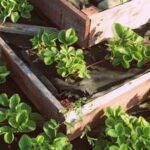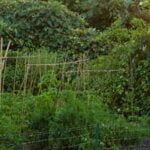Are you interested in starting a fruit and vegetable garden in Florida? If so, you’ve come to the right place. This guide to Florida fruit & vegetable gardening will provide you with everything you need to know to get started and maintain a successful garden in the unique climate of the Sunshine State. From understanding Florida’s climate and soil for gardening to tips for successful gardening, this article will cover it all.
Florida’s warm and humid climate, as well as its sandy soil, present both opportunities and challenges for growing fruits and vegetables. Understanding these conditions is key to successfully cultivating a thriving garden. In this guide, we’ll explore the best fruits and vegetables to grow in Florida, offer tips for successful gardening, discuss common pests and diseases that may affect your garden, and provide insight into essential tools and supplies needed for Florida gardening.
Whether you’re new to gardening or have years of experience, this comprehensive guide will equip you with the knowledge needed to start and maintain a fruitful fruit and vegetable garden in Florida. So, let’s dive in and discover how you can make the most of Florida’s unique climate for a bountiful harvest throughout the year.
Best Fruits to Grow in Florida
When it comes to growing fruits in Florida, there are several options that thrive in the state’s unique climate and soil. One of the best fruits to grow in Florida is citrus, including varieties such as oranges, grapefruits, and lemons. These fruits not only tolerate the warm temperatures and sandy soil of Florida but actually require these conditions to flourish.
Another excellent fruit to grow in Florida is blueberries, which have become increasingly popular due to their high antioxidant content and delicious flavor. Blueberries can be easily grown in pots or directly in the ground, making them a versatile option for any Florida gardener.
In addition to citrus and blueberries, strawberries are also a top choice for fruit gardening in Florida. With their short growing season and ability to produce multiple harvests per year, strawberries are an ideal choice for those looking to enjoy homegrown fruits throughout the year.
Other fruits that do well in Florida include bananas, peaches, and figs. By selecting the right varieties and providing proper care, it is possible to enjoy a bounty of fresh homegrown fruits even in the subtropical climate of Florida.
To ensure success when growing fruits in Florida, it is important to consider factors such as planting times, soil preparation, and proper maintenance. By following a guide to Florida fruit & vegetable gardening and tailoring techniques specifically for the region’s climate, gardeners can enjoy a productive fruit garden year after year. With the right knowledge and resources at hand, anyone can experience the joy of harvesting homegrown fruits from their own backyard in Florida.
Best Vegetables to Grow in Florida
When it comes to vegetable gardening in Florida, there are numerous options that thrive in the state’s warm and humid climate. Whether you’re an experienced gardener or just starting out, it’s important to choose the right vegetables for your Florida garden. Here are some of the best vegetables to grow in Florida:
- Tomatoes: Tomatoes are a staple in many Florida gardens due to their versatility and ability to thrive in the state’s climate. They can be grown year-round in Florida and come in a variety of shapes, sizes, and colors.
- Peppers: Bell peppers, jalapenos, and other varieties of peppers do exceptionally well in Florida’s warm weather. They can be grown in containers or directly in the ground.
- Squash: Both summer squash and winter squash varieties are well-suited for Florida’s climate. They require plenty of sunshine and regular watering.
In addition to these vegetables, other popular choices for Florida gardens include cucumbers, sweet potatoes, okra, and green beans. When selecting vegetables for your garden, it’s important to consider their specific growing requirements and how they will fare in the varying seasons of Florida.
Proper care and maintenance are essential for successful vegetable gardening in Florida. It is crucial to regularly water your plants, provide adequate sunlight, and protect them from common pests such as aphids and caterpillars. By following these tips and selecting the right vegetables for your garden, you can enjoy a bountiful harvest throughout the year.
Overall, with the right knowledge and preparation, you can experience an abundant vegetable harvest while gardening in Florida. Whether you’re a seasoned gardener or just starting out, the key is understanding which vegetables thrive in Florida’s unique climate and following best practices for care and maintenance.
By carefully choosing the best vegetables for your garden based on its specific conditions and following proven tips for success, you can create a thriving vegetable garden that provides delicious produce year-round.
Tips for Successful Gardening in Florida’s Unique Climate
Florida’s unique climate presents both opportunities and challenges for fruit and vegetable gardening. The abundance of sunshine and warmth creates a favorable environment for growing a wide variety of crops, but the intense heat, humidity, and occasional tropical storms can also pose difficulties for gardeners. In order to successfully grow fruits and vegetables in Florida, it is important to take certain factors into consideration.
Understanding the Climate and Its Impact on Gardening
One of the most essential aspects of successful gardening in Florida is understanding the climate and how it affects plant growth. The state experiences two main growing seasons: fall/winter and spring/summer. During the fall/winter season, cooler temperatures allow for the cultivation of cold-hardy crops such as lettuce, broccoli, and carrots. In contrast, the spring/summer season brings higher temperatures and humidity, ideal for warm-season crops like tomatoes, peppers, and squash.
Watering and Irrigation Techniques
Proper watering is crucial for successful fruit and vegetable gardening in Florida. The state’s hot climate accelerates evaporation, making it necessary to water more frequently than in other regions. Drip irrigation systems are highly recommended as they deliver water directly to the plant roots while minimizing water loss through evaporation. Additionally, using mulch around plants helps retain soil moisture and reduce weed growth.
Soil Preparation and Fertilization
Florida’s soil can vary greatly across different regions, so it is essential to have your soil tested before planting fruits and vegetables. This will help determine any deficiencies or pH imbalances that need to be corrected with specific fertilizers or soil amendments. Organic matter such as compost should be incorporated into the soil to improve its structure, fertility, and water-holding capacity.
Overall, successful fruit and vegetable gardening in Florida requires careful attention to the unique climate conditions of the state. By understanding these factors and implementing proper techniques for irrigation, soil preparation, fertilization, gardeners can maximize their yields while minimizing potential challenges that come with Florida’s distinct climate.
Common Pests and Diseases in Florida Fruit and Vegetable Gardens
When it comes to gardening in Florida, dealing with pests and diseases is an inevitable part of the process. The warm and humid climate of the state creates the perfect environment for a wide range of pests and diseases that can wreak havoc on your fruit and vegetable garden. Being aware of the common issues you may encounter and knowing how to prevent and treat them is crucial for successful gardening in Florida.
Some of the most common pests that you may encounter in your Florida fruit and vegetable garden include aphids, whiteflies, caterpillars, and spider mites. These pests can cause damage to your plants by feeding on their leaves, stems, or fruits. In addition to pests, Florida gardens are also susceptible to various diseases such as fungal infections, bacterial diseases, and viral infections. These can lead to wilting, yellowing of leaves, stunted growth, or rotting of fruits.
To combat these common pests and diseases in your Florida garden, here are some tips to keep in mind:
- Regularly inspect your plants for any signs of pest infestations or disease symptoms.
- Encourage natural predators such as ladybugs or praying mantises to help control pest populations.
- Practice good garden hygiene by removing any dead or diseased plant material promptly.
- Use organic pesticides or fungicides as a last resort, being mindful of their impact on beneficial insects and the environment.
By staying vigilant and taking proactive measures to protect your plants from pests and diseases, you can maintain a healthy and thriving fruit and vegetable garden in Florida. Despite the challenges posed by the state’s unique climate, proper care and attention will ensure a bountiful harvest for you to enjoy.
Essential Tools and Supplies for Florida Gardening
When it comes to fruit and vegetable gardening in Florida, having the right tools and supplies can make all the difference in the success of your garden. Because Florida’s climate and soil can be quite unique, it’s important to have the specific tools and supplies that will help you navigate these challenges.
One essential tool for Florida gardening is a high-quality watering system. With Florida’s hot and humid weather, plants often need more frequent watering to thrive. Drip irrigation systems are especially effective for ensuring that your plants receive a consistent water supply without promoting disease or evaporation.
In addition to watering systems, it’s important to have the right soil amendments for your Florida garden. This may include organic matter such as compost or well-rotted manure to improve soil structure and nutrient content. Additionally, having access to shade cloth or row covers can help protect your plants from intense sun or pests while still allowing air circulation.
Furthermore, having a good set of hand tools specifically suited for the demands of Florida gardening is essential. Look for durable trowels, pruners, and weeding tools that can withstand the rigors of working in Florida’s sandy soil and periodic heavy rains.tract.
| Essential Tools | Supplies |
|---|---|
| Drip irrigation system | Compost or well-rotted manure |
| Shade cloth or row covers | Durable hand tools (trowels, pruners, weeding tools) |
Maintaining a Florida Fruit and Vegetable Garden Throughout the Year
Year-Round Care
In Florida, gardening is a year-round activity due to the state’s warm climate. This means that you’ll need to stay on top of your garden maintenance throughout the year. Regular watering, fertilizing, and weeding are essential tasks to keep your plants healthy and thriving. It’s also important to monitor the weather and adjust your care routine as needed, especially during the hot and rainy summer months.
Seasonal Considerations
Florida’s distinct seasons bring unique challenges and opportunities for fruit and vegetable gardening. During the fall and winter, you’ll want to focus on planting cool-season crops such as kale, lettuce, and radishes. Spring is the perfect time to start warm-season vegetables like tomatoes, peppers, and squash. In the summer, be prepared for intense heat and humidity by providing extra shade for delicate plants and increasing watering frequency.
Managing Soil Health
Regular soil testing is crucial for maintaining a healthy garden in Florida. The state’s sandy soil can often lack essential nutrients, so it’s important to amend it with organic matter and fertilizers as needed. Mulching can also help retain moisture and protect the soil from erosion caused by heavy rainfall. Additionally, rotating crops each season can prevent nutrient depletion and reduce the risk of disease buildup in the soil.
By staying proactive in caring for your fruit and vegetable garden throughout the year in Florida, you can ensure a bountiful harvest and enjoy fresh produce all year long.
Harvesting and Enjoying the Fruits of Your Labor in Florida
In conclusion, Florida’s unique climate and soil offer ideal conditions for fruit and vegetable gardening. With the right knowledge and preparation, gardeners can enjoy a bountiful harvest year-round.
By understanding the best fruits and vegetables to grow in Florida, as well as the common pests and diseases to watch out for, gardeners can set themselves up for success. Additionally, having the essential tools and supplies on hand, as well as following tips for successful gardening in Florida’s climate, will ensure a thriving garden.
With this guide to Florida fruit & vegetable gardening, gardeners can take pleasure in the process of cultivating their own produce and enjoying the literal fruits of their labor. Throughout the year, there is always something to plant, tend to, and ultimately harvest in Florida’s temperate climate. Whether it’s juicy citrus fruits, succulent tomatoes, or crunchy bell peppers, there is an array of options to choose from when it comes to growing your own produce.
Ultimately, maintaining a Florida fruit and vegetable garden requires dedication and patience. However, with the proper care and attention, gardeners can reap the rewards of fresh, flavorful fruits and vegetables grown right in their own backyard. Gardening in Florida is not just a hobby – it’s a way of life that offers both satisfaction and nourishment. With this comprehensive guide at your disposal, you can embark on your own journey of fruitful gardening in the Sunshine State.
Frequently Asked Questions
What Vegetables and Fruits Grow Best in Florida?
Florida’s climate and soil make it ideal for growing a variety of vegetables and fruits. Some that thrive in the state include tomatoes, bell peppers, squash, strawberries, and citrus fruits like oranges and grapefruits.
When Should I Start a Vegetable Garden in Florida?
The best time to start a vegetable garden in Florida is during the fall or early spring. This allows the plants to establish themselves before the hot summer months. It’s important to consider the specific planting times for each vegetable based on its optimal growing season.
What Vegetables Don’t Grow Well in Florida?
While many vegetables and fruits do well in Florida, there are some that don’t thrive as easily in the state’s climate. For example, cool-season crops like broccoli and cauliflower may struggle due to the warm temperatures. Additionally, certain root vegetables like carrots may not grow as successfully in Florida’s sandy soils.

If you’re looking to get into vegetable gardening, or are just looking for some tips on how to make your current garden better, then you’ve come to the right place! My name is Ethel and I have been gardening for years. In this blog, I’m going to share with you some of my best tips on how to create a successful vegetable garden.





